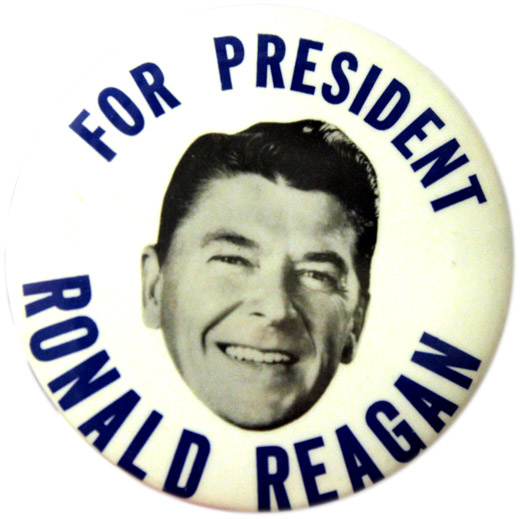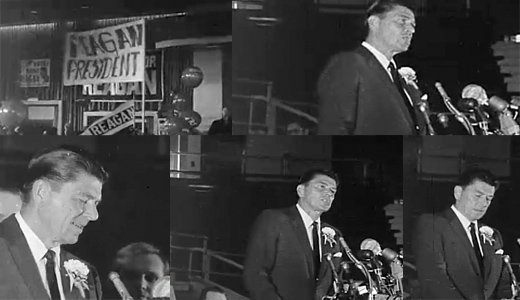Strange Bedfellows: Ronald Reagan & Nelson Rockefeller at the '68 Convention
 Wednesday, February 16, 2011 at 12:55AM
Wednesday, February 16, 2011 at 12:55AM By the 1968 Republican National Convention in August, Richard Nixon had all but locked up the nomination. His only remaining challengers were both long-shots: Nelson Rockefeller of New York, who had previously lost the 1964 nomination to Barry Goldwater, and Governor Ronald Reagan of California, who had only just been elected in California two years before, in 1966. The election of 1968 might have been very different had this political odd-couple only secured five more delegates from Florida on the first ballot of the RNC. The burden of this task fell on the shoulders of the Reagan campaign, but had he succeeded, a convention battle might have propelled one of them to the nomination, leaving Richard Nixon in the dust-bin of history.
Candidates Rockefeller and Reagan could not have been more ideologically opposed, even in the 1960's. As a moderate, many of Nelson Rockefeller's positions were fairly liberal, especially with the unions, the environment, education and infrastructure spending. To boot, he had increased New York State's budget by over 350% in just 14 years. On the flip side, Reagan was a consummate fiscal conservative and had campaigned in '66 on the slogan, "send the welfare bums back to work." He worked to balance the budget by freezing hiring and raising taxes (yes, raising taxes). Furthermore, the fact that Reagan had risen to prominence in 1964 through his adamant support of Rockefeller's chief opponent, Barry Goldwater, only elevated their differences.

Yet from the start of the summer of '68, Rockefeller and Reagan's fortunes were tied -- their only hope of attaining the nomination was to deprive Nixon of a majority of delegate votes, since their individual numbers were coming up short. In July of '68, Rockefeller's surrogate met with Reagan and a deal was struck: both underdog candidates would stay in the race and would try to peel away as many Nixon delegates as possible before voting began on the floor. With a little luck, Nixon would fall short on the first ballot and the ensuing shock-wave would quickly destroy his image as the inevitable candidate, paving the way for a prolonged convention battle could only help Rockefeller and Reagan.

With their delegate estimates hovering on the cusp of the 600 necessary votes, Nixon's operation staff was calm and confident and their "no drama" approach only reinforced the image that Nixon was the inevitable choice. Rockefeller's staff estimated a best case scenario of receiving about 300 votes, yet they were dependent on Reagan's ability to reach approximately 267 votes in order to proceed to the second ballot. The key to their strategy lay in the south -- Reagan had to appeal to southern delegates, many of whom had already committed to Richard Nixon. Of the southern states Florida held the most sway and since it was early on the roll call -- thus a deal with the Florida delegation was crucial because if Florida went for Reagan, other southern delegations were more likely to follow.
Reagan's team proposed a deal with the Florida delegation that would allow it to abide by the "unit rule," a technicality that allowed a state to cast all of its votes with it's majority individuals, rather than splitting proportionally. Having obtained pledges from 12 of the 34 Florida delegates, one man stood in the way, William Murphin of Hobe Sound, who led the delegation. While Murphin was open to voting as a unit, he would only abide if Reagan could gain the support of 3-5 more Florida delegates. But this is where Reagan's effort fell short -- both Rockefeller and Reagan's ambitions were dashed when Reagan was unable to peel away any more Florida delegates.
In the end, Nixon reached the magic number on the first ballot and became president after defeating Hubert Humphrey. Despite a noble effort, Nixon never considered Reagan as a running mate, referring to him as a "glamor boy". Rockefeller later became Vice President under Gerald Ford and Reagan ran and lost again in 1976 and finally won in 1980.
While the primary system has since made political conventions moot since the 1960's, does a fractured Republican party in 2012 make a divided convention more likely?
 1968,
1968,  Convention,
Convention,  Nelson Rockefeller,
Nelson Rockefeller,  Nixon,
Nixon,  RNC,
RNC,  Ronald Reagan
Ronald Reagan 
